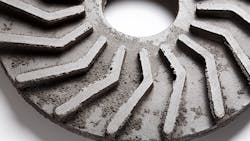Understanding the Science Behind Penetration Defects
Mold coatings are a well-known preventative measure to address penetration defects. Undoubtedly you’ve heard this before, though. Still, it’s critical to recognize what makes a good coating. Rheology (a technical term used by researchers) explains what separates and distinguishes a good coating from the others. In short, rheology describes the measurement / determination of a liquid / solid matter’s flowability.
Now, it’s important to ask, “What is flowability?” This is a term that characterizes the effects of deformation on the liquid, as well as solid components. The deformation of matter is essentially a reaction at the impact of a specific force. Surely this all makes sense, right? (I’m kidding, of course.)
However, just know this, the effects of poor rheology will include insufficient layer thickness, teardrops, runs, prolonged handling times, inhomogeneity, and problems with core prints. Ultimately, it’s very important to trust a coating supplier with strong Research & Development and proven Technical Services. That way, you’ll ensure you’re receiving a coating with the ideal rheology characteristics to meet your requirements.
Now, let’s discuss the science behind a penetration defect.
Penetrations: Defect Pattern & Causes — Fundamental causes for real (mechanical/physical) penetration are metallostatic pressure, dynamic pressure during casting, and crystallization pressure during solidification.
Penetration can thus occur as a function of the following influence factors:
• The grain size of the mold material is too large and the grain particle size distribution is too broad;
• The proportions of binder are too low. The proportion of materials that form lustrous carbon is too low
• Unfavorable chemical composition of the casting material in combination with casting temperatures and metallostatic pressure that are too high;
• Inadequate and uneven compaction of the molds or cores;
• Inadequate gating system and therefore excessive overheating of molds and core components.
Join the Conversation. Email Your Questions for ASK Chemicals
Share your insights, opinions, and elaborate on the questions and the experts' answer(s). You must be logged in to the website in order to post your comments.
